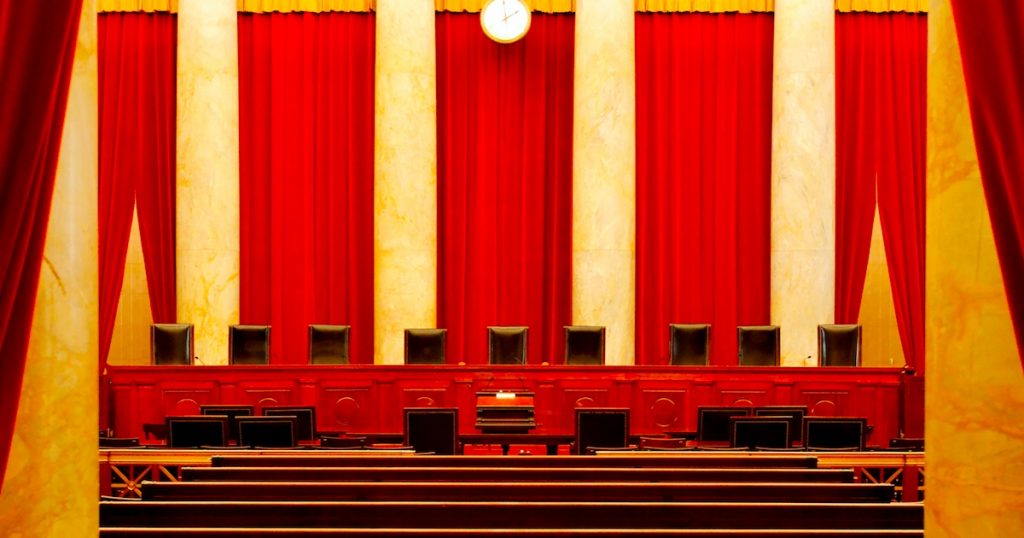
Impeachment is not a criminal trial, it is a political trial. A crime does not have to have been committed.
This is part two of a four part series of articles concerning misinformation about the judicial branch of our federal government. The judiciary has become an arm of tyranny and has stolen legislative and executive authority. The founders feared and warned about this very thing occurring. These judges need to be reined in. And it is possible and plausible, and not unprecedented. This will, however, take a generation, if we educate ourselves on The Constitution and the true nature and role of the judiciary.
In part one, I tackled the myth that the three branches of the federal government (Legislative, Executive, and Judicial) are separate and equal. They are most definitely not equal. The Legislative branch is the most powerful, followed by the Executive, and, according to The Constitution, The Federalist Papers, and the Founders, the weakest branch is the Judiciary. Read the full post here.
Like I mentioned in part one, I give no relevance to modern day judges’ interpretations concerning these matters. There is no branch which is more incestuous than the judicial branch, and I only regard The Constitution, The Federalist Papers, and original words of the Founders as authority on these matters. Nor do I take much stock in modern historians who do not rely solely on original sources.
Why do I not take any credence in modern-day constitutional review by our judiciary? Because their supposed authority to do so is derived from the ether. They gave this authority to themselves, it is NOT granted by The Constitution. Read Article III for yourself. Furthermore, on this webpage found at the Supreme Court’s website, they admit they derived this authority from one of their own, Chief Justice John Marshall, in Marbury v. Madison. Marshall declared with his now tyrannical pen, “”It is emphatically the province of the judicial department to say what the law is.” And like that, our modern-day judiciary has the “authority” to review every law and to create law, and is the only “authority” who can opine on the constitutionality of everything and anything. It’s right there, on the Supreme Court’s website. They know The Constitution gives them no real authority to do so , so they have to point supposed authority somewhere, or they lose power. Click here, it’s written >right here. They’ve admitted it themselves: they don’t get this authority from The Constitution, but from an incestuous relationship with one of their own. I forewarn you, there is a lot of rotten fruit on that page.
Myth: Federal Judges Are Guaranteed A Lifetime Appointment
Although many federal judges sit in their chairs until they die, or voluntarily retire when it is most politically advantageous, The Constitution does not guaranty them a lifetime appointment. According to Article III of The Constitution:
The judges, both of the supreme and inferior courts, shall hold their offices during good behaviour…
Okay, so what constitutes “good behavior?” The Constitution does not answer this question. What about the founders’ intentions? I’ve read all the notes taken at The Constitutional Convention (yes, I’m that big of a history nerd), and there wasn’t much discussion on the “good behavior” clause. No clarifying words in The Federalist papers either.
Well then, let’s direct our attention to the debate in the senate regarding The Judiciary Act of 1802. Senator John Ewing Calhoun of South Carolina stated:
We all fully and at once understand what is good behaviour in a judge, the oath he takes and the very nature of his office show it; to act with justice, integrity, ability and honor, and to administer justice speedily and impartially, is good behaviour; if he acts contrary, it would be misbehaviour, and the Constitution in that case has given a remedy by impeachment.
If impeachment is the remedy for misbehavior, then let us turn to The Constitution and see what it says about the standards for impeachment. Article II, Section IV states the causes for impeachment:
…treason, bribery, or other high crimes and misdemeanors.
Modern-day high-priests of the law equate high crimes as felonies and misdemeanors as crimes less than felonies. However, it is important to use the definitions and intent of the time in which the words were written. According to founding father Noah Webster, misdemeanor was defined as:
Ill behavior; evil conduct; fault; mismanagement.
Webster continues:
In law, an offense of a less atrocious nature than a crime. Crimes and misdemeanors are mere synonymous terms; but in common usage, the word crime is made to denote offenses of a deeper and more atrocious dye, while small faults and omissions of less consequence are comprised under the gentler name of misdemeanors.
So, according to the language of the time, a misdemeanor is less than a crime, therefore, NOT a crime at all. Ill behavior, evil conduct, fault, and mismanagement. That is a pretty low bar for impeachment. Well, a lower bar than what most people think is set for impeachment.
In reality, since The Constitution doesn’t clarify the precise reasons for impeachment, I argue that the precise reasons for impeachment can be decided by congress at the time, while using the few causes for impeachment in The Constitution as a guideline. If we don’t like their reasons, we can vote them out of office, or make our displeasure known through other civil methods.
It is important to note that an impeachment trial is not a criminal trial, it is a political trial. A crime need not have been committed in order to proceed with impeachment.
High crimes and misdemeanors was a phrase known by the founders. The phrase refers to a breach of the public’s trust. This notion is supported by Federalist #65.
There are five different clauses in The Constitution regarding impeachment. Feel free to correct me, but according to my count, no subject in our founding document has more clauses. Our founders felt that impeachment was an important tool to stop tyranny and injustices. But congress, and the people, treat impeachment like it is radioactive.
James Iredell, who became one of the first Supreme Court Justices, appointed by Washington, stated:
…vesting the power of impeachment in the House of Representatives, is one of the greatest securities for a due execution of all public offices. Every government requires it. Every man ought to be amenable for his conduct, and there are no persons so proper to complain of the public officers as the representatives of the people at large. The representatives of the people know the feelings of the people at large, and will be ready enough to make complaints. If this power were not provided, the consequences might be fatal. It will be not only the means of punishing misconduct, but it will prevent misconduct. A man in public office who knows that there is no tribunal to punish him, may be ready to deviate from his duty; but if he knows there is a tribunal for that purpose, although he may be a man of no principle, the very terror of punishment will perhaps deter him.
At times in the past, a mere threat of impeachment of a judge has forced the judge to reconsider his behavior. Impeachment is a bridle to rein in those that have stepped outside constitutional bounds or that have stepped beyond the will of the people. Congress, and therefore the people, hold the reins to bridle through impeachment.
Have federal judges ever been impeached and removed? They sure have. And here’s some of the reasons:
- Contradicting an act of congress
- Drunkenness in private life
- Rudeness in the courtroom
- Profanity
- Judicial high-handedness
Most recently, US District Judge Alcee Hastings was impeached by The House of Representatives in 1988 by a vote of 413–3, and later convicted and removed by The Senate on October 20, 1989. The cause for impeachment? Bribery. As a side note, in 1992, the good people of Florida’s 23rd district decided that bribery was a good qualification for congress and elected Alcee Hastings as their representative in The House. He is still serving as of this writing.
Both impeachment and conviction are an uphill battle, but the difficulty of the task should not deter congress from exercising one of their constitutionally enumerated powers when they feel it is necessary to do so. Once impeachment proceedings go forward, if the people don’t like it, the people can stop it by petitioning their representatives. Additionally, if judges know that congress will use this power, it will keep the judiciary in check, as I pointed out earlier with the statement from Iredell.
Do I think that any specific current Supreme Court Justice should be impeached? Yep. Ruth Bader Ginsburg for sure. She has shown on more than one occasion her disdain for our constitution, a document that she swore to uphold. And, if the reports concerning John Roberts are true, that he horse trades for how he lands on his judicial opinions, he absolutely needs to, and deserves to be impeached.
I definitely think those two should be impeached, but I’m not calling for it. We already have too much division in the country. An impeachment trial for Ruth Bader Ginsburg would be claimed to be unconstitutional by anyone who exercises idolatry towards her. The population as a whole is so poorly educated on constitutional matters, most would actually believe it IS unconstitutional for a Justice to be impeached. They would twist and pervert the meaning of The Constitution to support their ignorance. This is why I said it will take a generation for misinformed attitudes towards the judiciary to be corrected. Furthermore, the current power structure of The House would not support any removal of a sitting Justice with their arch enemy in the White House.
Finally, although it is not related to judicial myths, I feel it necessary to opine on the current calls for the impeachment of Trump. Has he committed acts worthy of impeachment? I have no idea. According to Webster’s definition mentioned above, Trump is most definitely guilty of misdemeanors, but So was Obama, George W. Bush, and so on. There is so much fake news on both sides, who knows what is true? The democrats have so much blind hatred for The Orange Man, I really think they see things that are not really there, and could point their accusing fingers at their hypocritical selves while calling Trump corrupt.
Furthermore, there is so much Trump idolatry on the republican side, they will ignore any actual evidence of corruption because Trump can never do wrong in their eyes. It will further split our already damaged republic.
However, it is entirely up to our duly elected congress to determine impeachment. It is a consequence of elections. As mentioned before, if we don’t like their impeachment actions and decisions, we can remedy it through civil actions.
Part 3 – Myth: The Role Of The Judiciary Is To Protect The Minority From The Majority


interesting…
I’m curious as to where you got your law degree?
Just kidding. I think most law schools don’t even mention our constitution at all. If someone has a law degree, i have to hear them talk about the constition before i decide if they can be trusted or not. if they quote some obscure judge that no one voted for in order to support their liberty logic, i’m out.
hahahahahahaha!!!
The judge gets impeached and Florida votes him into congress?! No wonder florida is messed up.